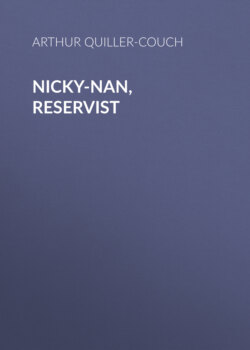Читать книгу Nicky-Nan, Reservist - Arthur Quiller-Couch - Страница 12
На сайте Литреса книга снята с продажи.
THE FIRST SERMON.
ОглавлениеSome ten minutes after the brakes had departed, Mrs. Polsue and Miss
Oliver, bound for divine service, encountered at the corner where
Jolly Hill unites with Bridge Street, and continued their way
together up the Valley road.
"Good-morning! This is terrible news," said Miss Oliver, panting a little, for she had tripped down the hill in a great hurry.
"I have been expecting it for a long while," responded Mrs. Polsue darkly. Like some other folks in this world, she produced much of her total effect by suggesting that she had access to sources of information sealed to the run of mankind. She ever managed to convey the suggestion by phrases—and, still more cleverly, by silences—which left the evidence conveniently vague. To be sure, a great-uncle of hers had commanded in his time a Post-Office Packet plying between Falmouth and Surinam, and few secrets of the Government had been withheld from him: but he was now, as Mrs. Polsue had to confess, "no more," and when you came to reflect on it (as you sometimes did after taking leave of her), the sort of knowledge she had been intimating could hardly have been telegraphed from another and better world. She had also a cousin in London, "in a large way of drapery business," who communicated to her—or was supposed to communicate—"what was wearing": an advantage which she used, however, less to refresh her own toilettes than to discourage her neighbours'. Moreover, there was a brother-in-law somewhere "in the Civil Service," to whom she made frequent allusion. But the knowledge she derived from him concerning State secrets or high politics could, at the best, but be far from recent, because as a fact the pair had not been on terms of intercourse by speech or letter since her husband's decease twelve years ago. (There had been some unpleasantness over the Will.)
"I have been expecting it for a long while," asseverated Mrs. Polsue.
"Gracious! Why?"
"You are panting. You are short of breath. You should be more careful of yourself than to come hurrying down the hill at such a rate, at your time of life," said Mrs. Polsue. "It reddens the face, too: which is a consideration if you insist on wearing that bit of crimson in your hat. The two shades don't go together."
"It is not crimson. It is cherry," said Miss Oliver.
"Which, dear?"
"The ribbon, Mary-Martha. You should wear glasses. … But I started late," Miss Oliver confessed. "I didn't like to show myself walking to Chapel, and so many of the men-folk passing in the opposite direction. It seemed so marked." She might have confessed further (but did not) that she had waited, peeping over her blind, to see the brakes go by. "But you were late too," she added.
"If you will use your reason, Cherry Oliver, it might tell you that I couldn't get past the crowd on the bridge, and was forced to wait."
"Dear me, now! Was it so thick as all that? … You know, I can't see the bridge from my back window—only a bit of the Old Doctor's house past the corner of Climoe's: and I shan't see the bridge even when the old house comes down. But I called in builder Gilbert last Monday on pretence that the back launder wanted repairing; and when he'd examined it and found it all right, I asked him how pulling down that house would affect the view: and he said that in his opinion it would open up a bit of the street just in front of the Bank, so that I shall be able to see all the customers going in and out."
This was news to Mrs. Polsue, and it did not please her at all. Her own bow-window enfiladed the Bank entrance (as well as that of the Three Pilchards by the Quay-head), and so gave her a marked advantage over her friend. To speak in military phrase, her conjectures upon other folks' business were fed by a double line of communication.
"Well, my dear, you won't pry on me going in and out there," she answered tartly, with a sniff. "Whenever I wish to withdraw some of my balance, to invest it, I send for Mr. Pamphlett, and he calls on me and advises—I am bound to say—always most politely."
But here Miss Oliver put in her shot. (And Mrs. Polsue indeed should have been warier: for the pair were tried combatants. But a tendency to lose her temper, and, losing it, to speak in haste, was ever her fatal weakness.)
"Why; of course, … and that accounts for it," Miss Oliver murmured.
"Accounts for what?"
"Oh, nothing. … There was a visitor here last summer—I forget her name, but she used to go about making water-colours in a mushroom hat you might have bought for sixpence—quite a simple good creature: and one day, drinking tea at the Minister's, she raised quite a laugh by being so much concerned over your health. She said she'd seen the doctor calling at your house almost every day with a little black bag, and made sure there must have been an operation. She mistook Mr. Pamphlett for the doctor, if you ever heard tell of such simple-mindedness."
